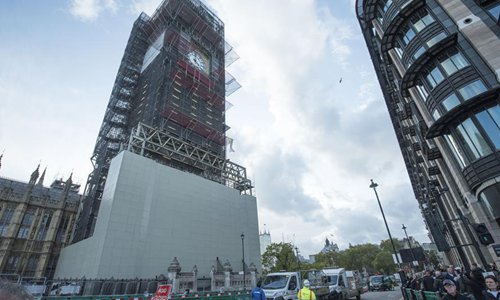HOME >> OPINION
HK rioters’ acts show violence quotient highest in the world
By Adam Garrie Source:Global Times Published: 2019/10/23 19:28:40

The surrounding roads are closed as an Extinction Rebellion protester demonstrates on the scaffolding surrounding the Elizabeth Tower, also known as the Big Ben, in London, Britain, on October 18. Photo: Xinhua
For most ordinary Londoners, the self-described climate change activist group Extinction Rebellion is irksome with disruptive provocateurs who are exploiting genuine concerns about long-term climate impact in order to bring the British capital to a halt. It has already been reported that the group's provocations have delayed the arrival of a cancer patient to a prominent London hospital. An even more recent provocation during which protesters climbed atop a train, only ended when working-class commuters dragged the visibly well-off men from the top of the train. After being dragged away, the provocateurs were restrained by an angry crowd desperate to go to work and carry on with their lives.
But this is not where the controversy ends. The group also aims to subvert the British Constitution by creating a so-called citizens' assembly whose power would apparently reign supreme over the Parliament and head of state. Beyond this, the group's cofounder Roger Hallam has said, "We are not just sending out emails and asking for donations. We are going to force the governments to act. And if they don't, we will bring them down and create a democracy fit for purpose… and yes, some may die in the process."
This threat should be taken very seriously. Groups like the Islamic State have often used similar language to promote their illegal cause and there is no reason why Hallam's words should be taken any less seriously.
While English streets are often home to legal peaceful protests, Extinction Rebellion is something very different. Members of the radical group admit this themselves. Extinction Rebellion member Sarah Lunnon recently appeared on British radio where she stated that the group's whole philosophy "is to disrupt." She later admitted that some protesters are remunerated for their disruptive activities although she clammed up when asked to explain the source of such funds.
If one lives in Hong Kong, there is little doubt that much of what is occurring in London is familiar. In Hong Kong, riots continue to plague the streets, open squares, train stations and private businesses. What began as a controversial though mostly peaceful protest against a specific change to judicial policy has now grown into an all-out assault on the law-abiding people and social norms of Hong Kong.
In spite of rioters in Hong Kong placing police lives in danger, thus far, the response from the authorities has been noticeably restrained. This is especially true when compared with the treatment of nationalist Yellow Vest protesters by French police and also the treatment of Catalan independence protesters by Spanish police.
In Britain, police have traditionally been far less aggressive than in continental Europe, but even so, after a week and a half of Extinction Rebellion erecting encampments in central London thoroughfares, police ultimately cleared the area and made arrests of those who would not peacefully disperse.
And yet, Hong Kong's rioters have shown a propensity for violence that has thus far outdone protesters in the UK, France or Spain. It is the duty of the police to protect civilians and property against violence by any criminal organization. This is distinct from overseeing a peaceful protest.
Now after months of rioting, there is hardly any doubt that gangsterism on the streets of Hong Kong would not and should not be tolerated anywhere. Lawlessness tends to beget lawlessness and in the case of Hong Kong ordinary people are clearly getting fed up. Beyond this, the vandalism against legislative chambers, police stations and the burning of the national flag makes it perfectly clear that the Hong Kong rioters are not looking to improve their country. Instead, it has become self-evident that they are looking to destroy their country.
In London, working-class people openly took charge against visibly wealthy Extinction Rebellion protesters because unlike the protesters, they had to reach their workplaces. In Hong Kong, business, workers and the international reputation of the city are being ravaged by the actions of the rioters. Perhaps it will not be long until the ordinary people of Hong Kong also become exhausted by the violence perpetrated by the provocateurs and begin to take matters in their hands.
The lessons from London and Hong Kong are that provocations, violence and disruptions are acts of lawlessness and vandalism which can never have any legitimate purpose. In this sense, it would be helpful if all members of the international community respected the internal law and order of all countries. Sadly, this has not been the case in Hong Kong as some in Western countries have sided not with the defenders of law and peace but with criminals and vandals.
It would be helpful if upon reflection, these double standards could give way to consistent and rational thinking.
The author is director of Eurasia Future, an independent news platform. opinion@globaltimes.com.cn
Posted in: VIEWPOINT